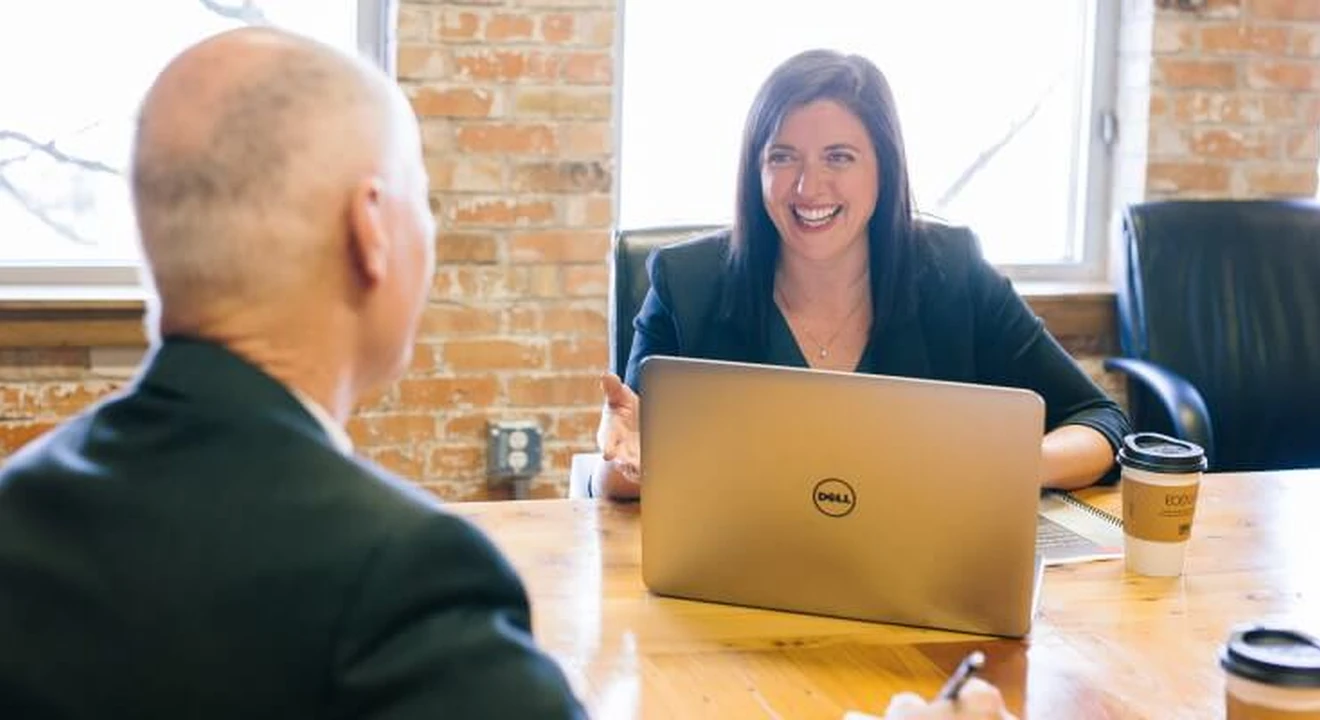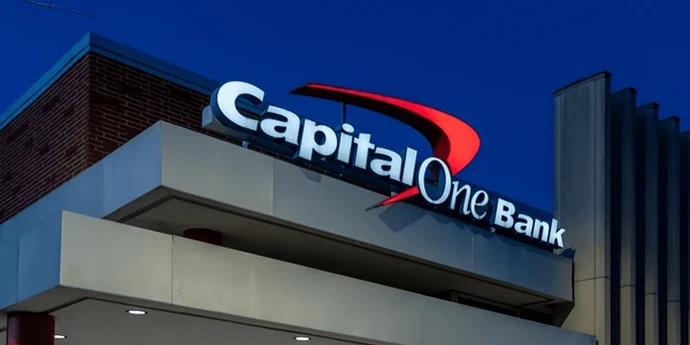BCG case interviews don't have to be complicated. Over the years we have managed to develop a simple step-by-step system to get you from "What are case interviews like at BCG?" to "I am confident I can get a job at BCG".
We have helped more than 30,000 candidates prepare for their consulting interviews, and in this guide, we have summarised the most important things you need to know to prepare for your BCG case interviews.
Here's an overview of what we'll cover:
Click here to practise 1-on-1 with BCG ex-interviewers
Part 1: BCG interview process and skills tested
The first step towards getting an offer at BCG is understanding the process you will have to go through and the skills BCG will be testing you on.
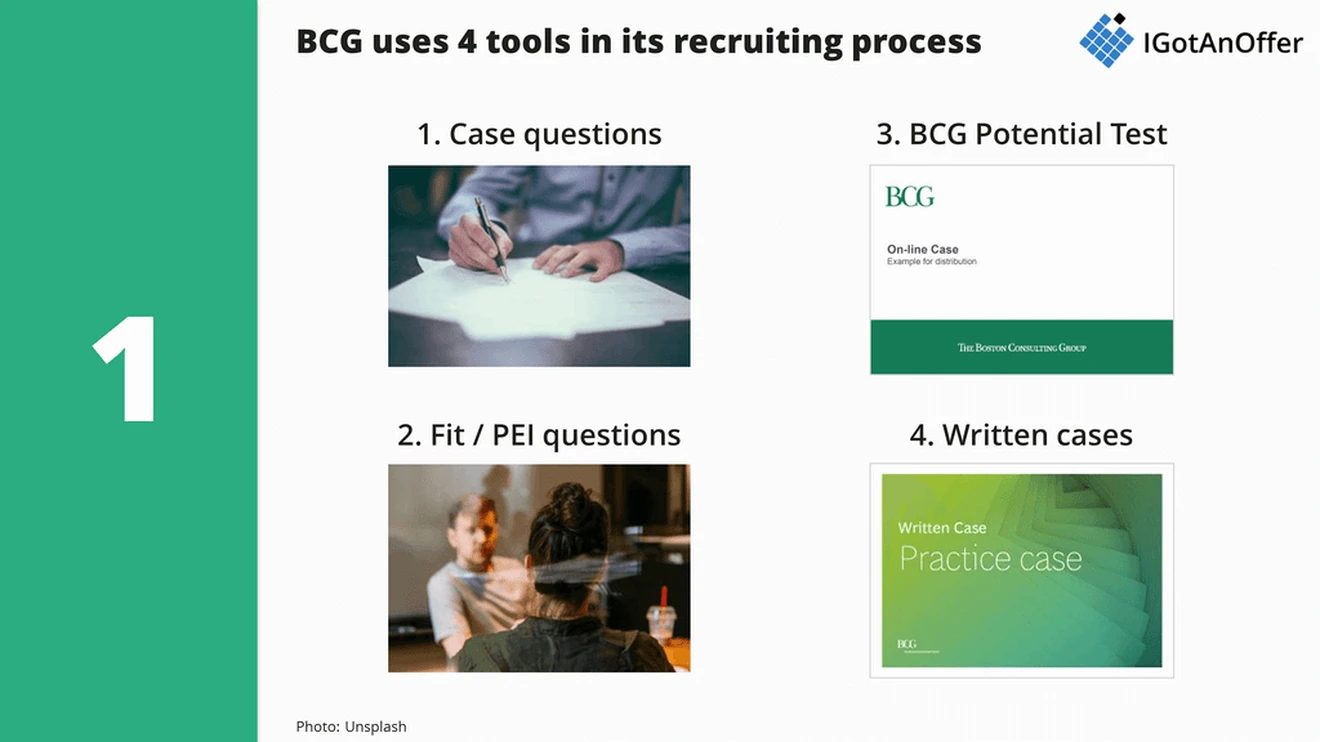
1.1 Three steps to get an offer
Let's first step through the different recruitment stages at BCG. In most countries this process entails 3 steps:
- Resume and cover letter screening
- First round interviews
- Second round interviews
First, recruiters will look at your resume and assess if your experience matches the open position. This is the most competitive step in the process—we’ve found that 90% of candidates don’t make it past this stage.
You can use this free resume guide and this free cover letter guide to help tailor your application to the position you’re targeting.
And if you’re looking for expert feedback, you can also get input from our team of ex-MBB recruiters, who will cover what achievements to focus on (or ignore), how to fine tune your bullet points, and more.
After that, you must complete the interviews. BCG uses 4 tools to assess candidates during its first and second round interviews:
You will get a combination of Fit / PEI questions and case interview questions in ALL your interview rounds. Your interviewer will typically ask you a one or two Fit / PEI questions (~10mins) and then move on to a case interview (~30 to 40mins). We will cover the type of Fit / PEI questions and case interviews you can expect at BCG in detail below.
In addition to fit and case questions, BCG also uses the BCG Potential Test or Online Case as well as a Written case.
The BCG Potential Test was originally used in FIRST-ROUND interviews. There are two versions of the test. A computer-based one which includes 23 questions to be answered in 45 minutes. And a paper-based one which includes 53 questions to be answered in 50mins.
The BCG Potential Test has been replaced by BCG's Online Case. This test has a chatbot case interview (Casey chatbot) and a video recommendation section and lasts up to 35 minutes.
BCG also sometimes uses a written case in SECOND-ROUND interviews. So far we have only heard of this being used in the US. For this written case, you will be given a set of documents, which you will use to answer case questions. You will then have 2 hours to answer these questions in the form of a 3 to 5 slide presentation, which you will have 15mins to present to your interviewer.
In a recent interview, BCG revealed they were hiring about 1,000 employees per year. As you probably know the competition for these spots is fierce. The acceptance rate at McKinsey is around 1% according to the firm's Managing Director. And we suspect that the intensity of the competition is similar at BCG.
This probably sounds intimidating. But the good news is that in our experience, it can actually become pretty straightforward to succeed at a BCG interview if you prepare in the right way.
1.2 Timeline to get an offer at BCG
When preparing for your BCG case interview, it can be difficult to know when to expect each stage of the interview process. To help illustrate a typical timeline, we've created the below overview of BCG's recruitment schedule. As a rule of thumb, you can expect the whole process to take 4 to 6 weeks.
Please note: this is meant to give you a general overview, and may not reflect your specific interview timeline. Actual interview timelines depend on a number of factors (e.g. Experienced hire vs. University hire). The below is based on the expected recruitment timelines at the University of Chicago (an MBB target school). You can find the original document from the University of Chicago here.
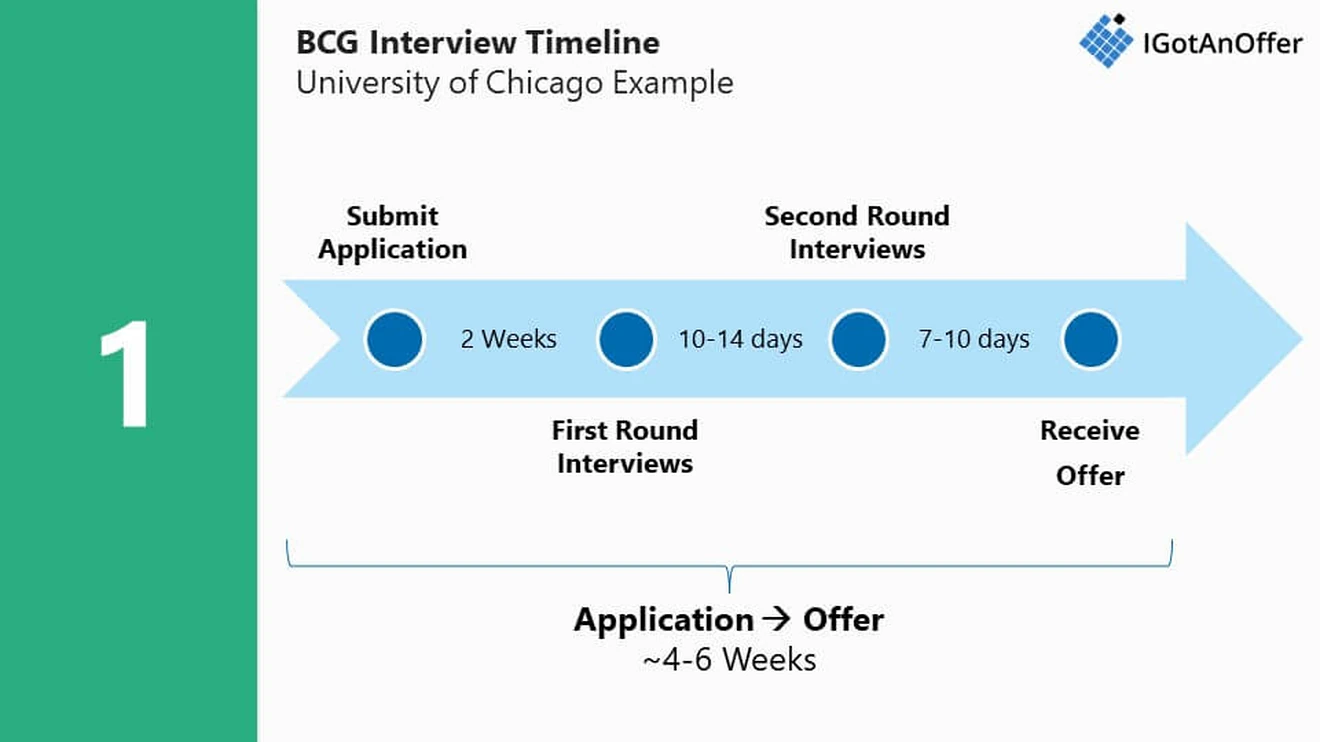
Deep dive into BCG's interview process and timeline by reading this guide.
1.3 Core skills to demonstrate to get an offer at BCG
There are three core skills BCG will test you on during their case interviews:
- Problem solving and maths
- Creativity and business sense
- Communication
First, BCG will have already started testing your problem-solving and maths skills with their BCG Potential Test. But virtually all the case interviews you get will continue testing this skill. In practice, this means that you need to be able to do mental maths quickly and accurately. And to solve the problem you are given in a clear and structured way.
Then, BCG will also test your creativity and business sense. As a consultant, you will often have to generate innovative ideas to solve the business problem at hand which is why consulting firms want to test you on this. For example, your interviewer could ask you to generate ideas on how to attract more visitors to an amusement park, or how to decrease the park’s costs.
Finally, your communication skills will also be tested throughout the process. Cracking the case is only half the battle. The other half is doing it in a way that is structured and easy to understand for your interviewer. In practice, that means you should follow a step-by-step approach to solve every question you get.
To get a feel for what strong and structured communication sounds like, take a look at the BCG & Bain live case interview extract included in part two below.
Part 2: BCG case questions
Now that you know what to expect in your BCG interviews, let's dive into the different parts you need to prepare for. We'll begin with case questions. The video below will give you a good overview of what BCG case interviews are like:
2.1 BCG case interview structure
Case interviews can be challenging, but the good news is that they can be broken down into seven different types of questions. If you can consistently solve each type of question, you will be able to consistently crack cases, which will help you get an offer at BCG. Learning to solve each type of question should therefore be your objective as you prepare for interviews.
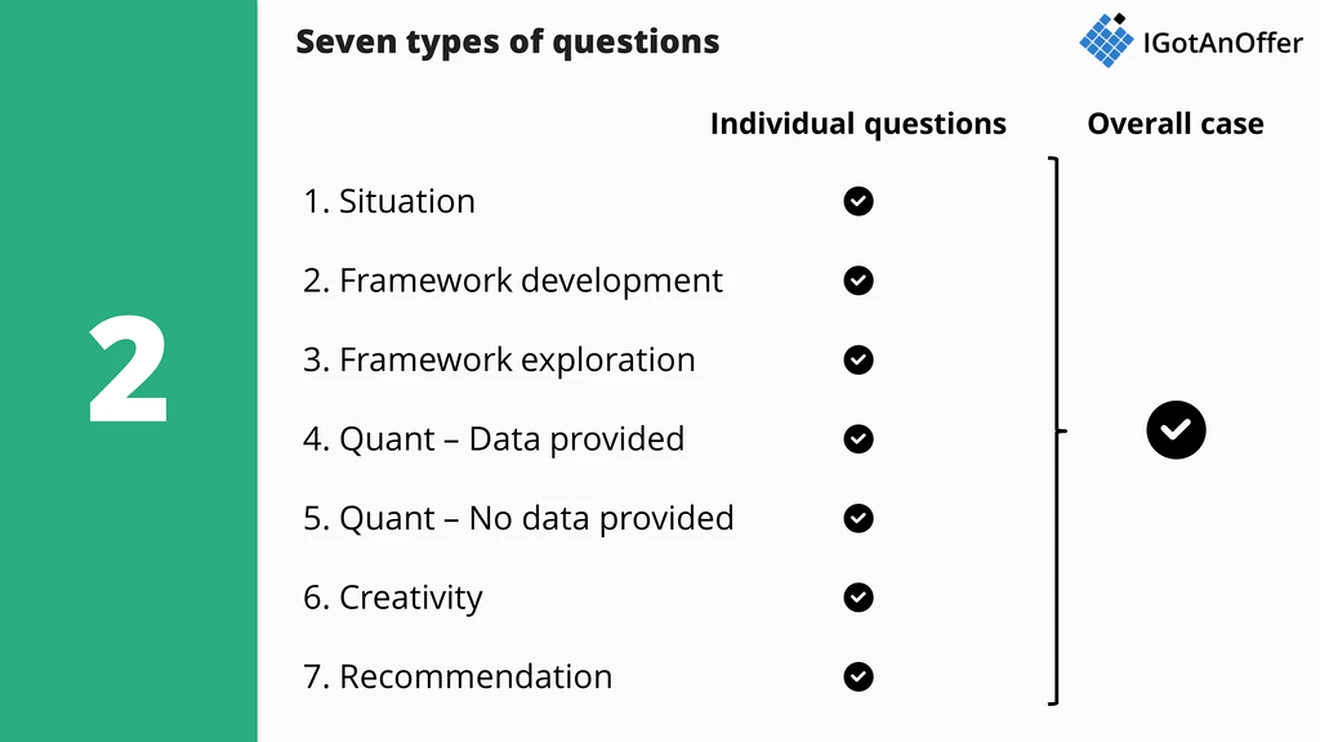
Let’s take a look at each of them one by one:
- Situation
- Framework development
- Framework exploration
- Quant question – Data provided
- Quant question – No data provided
- Creativity question
- Recommendation
You can read more about case interviews and how to prepare for them, in our ultimate case interview guide. The next few paragraphs will summarise the seven types of case questions mentioned above.
In every case, the first thing your interviewer will do is lay out the problem faced by the featured company. Then, they will ask you the areas you would look at to solve the company's problem. This is called the framework development question. If you would like to learn more about frameworks you should take a look at this blog post.
In certain types of business problems, you will then have to explore the framework to find the root-cause of an issue. This is the framework exploration question. For instance, if the objective of the case is to find why the company profits are going down, you will have to EXPLORE the framework and test different hypotheses. For example, profits could be going down because of revenues, costs, or both.
Note that you will not always get a framework exploration question. Your interviewer will sometimes jump straight into quantitative questions. For instance, you may be asked to analyse which countries Starbucks should go into next. The problem is not about finding the root-cause of an issue, and exploring your framework therefore makes less sense.
Next, you will usually have to solve a quantitative question to further understand the business problem at hand. There are essentially two types of quantitative questions in case interviews. Questions where the interviewer provides you with graphs and tables. And questions where no data is provided and you have to make assumptions by yourself.
In addition, your interviewer will also often ask a creativity question. These are typically open-ended questions such as “what can the company do to justify increasing its product prices?” These questions aim at assessing your capacity to generate qualitative ideas to solve the problem your client is facing.
Finally, at the end of the case, your interviewer will ask you a recommendation question. This will test your ability to summarise your thoughts on your client’s situation and what they should do as a result.
The order and format of these questions may vary slightly between your different interviews. But you will invariably come across them at some point during your cases and should be ready for them.
For an overview of the different types of case problems you might face, see our guide: 10 Common Types of Case Interviews.
2.2 BCG Interview questions
A great way to learn the 7 different types of case questions, is to practise with cases provided directly by BCG. On their website, BCG has a case library where you can learn the same kind of scenarios you might encounter on your BCG case interview.
Check out BCG's case library here, and try to map the questions in each case to the 7 different question types we have listed above.
You should also watch mock case interview videos on YouTube. We add pause points to our mock interviews so that you can practise alongside the candidate. The video below shows Gero, ex-BCG consultant turned interview coach, giving a high-quality answer to a revenue problem case.
As you're practising, try to replicate real-life conditions as much as possible. In the next few sections, we'll highlight a few tips that will help you perform on the candidate-led cases BCG uses. If you want even more tips, check out our larger post about case interview tips.
2.3 Tip #1: Make a hypothesis at the right time
One of the questions candidates often ask us when preparing for case interviews is: “Should I use a hypothesis? And if so, when should I use one?” Some coaches such as Victor Cheng from caseinterview.com use a hypothesis all the time. But doing this in practice can feel quite artificial during your case interviews.
For instance, if you are trying to decide what type of new beverage Coca-Cola should launch next year, using a hypothesis is possible but does not add a lot of value. You could start by saying something like: “I’m going to hypothesise that Coca-Cola should launch a new diet orange juice next year because customers are more and more health conscious”.
But, this would be nothing more than a wild guess at the beginning of a case. This is why a lot of candidates are uncomfortable using a hypothesis driven approach. In real life, the main situation when consultants use a hypothesis is when they are looking for the root-cause of an issue.
For instance, when they are trying to understand why the profitability of a company has decreased. The root-cause could be many things: lower price, lower volume, higher variable costs, etc. Using a hypothesis in these cases is actually very helpful because it enables consultants to stay really focused and to methodically test all the potential sources until the real issue is identified.
Our recommendation is therefore to do the same in your cases and to only use hypotheses in framework exploration questions where you are looking for the root-cause of an issue.
2.4 Tip #2: Lead the case
Another important feature of candidate-led cases at BCG is that the interviewer will want you to take lead on the case. This is why BCG cases are often called “candidate-led” cases. After you present your framework to your interviewer they won’t tell you what to do. They will expect you to take the lead and to suggest a next step.
This can be surprising at first, if not intimidating. However, there is a very simple way of dealing with this. Every time you answer one of your interviewer’s questions you should essentially suggest a next step.
For instance, if you have just presented your framework, you should say something like: “To summarise, I think we should look into revenues and costs to solve this problem. As a next step, my suggestion is to analyse revenues in more detail. I understand revenues have been going down. Would we happen to have any details on how fast that decrease has happened? And how it has impacted the company’s different products?”
By suggesting a next step and asking for more information, you are taking a lead on the case. Interviewers are instructed to be well-intentioned. If you get stuck or are not on the right track they will nudge you in a different direction.
2.5 Tip #3: Only make data assumptions if you have to
Another important aspect of candidate-led interviews at BCG is that they will require you to make more data assumptions than interviewer-led cases at McKinsey. This is because BCG tends to use more quantitative questions without giving you any data, but McKinsey is less likely to do that.
One question we often get from candidates is: “When should I make a data assumption vs. directly ask the interviewer for the data?” The answer to this is actually very straight forward. You should always ask for the data first. And only if your interviewer tells you the data is not available should you make data assumptions.
A lot of candidates worry about asking for data that’s not available. But in reality that’s actually perfectly fine. It’s really hard for you to guess which data points the interviewer has or doesn’t have. As a result, if you ask for a data point that your interviewer would like you to estimate, they will simply tell you that they don't have the data available.
2.6 Tip #4: Follow the BCG case interview dress code
Another question that candidates often wonder about before their first case interview with BCG, is how they should dress. There are a few things that you should keep in mind when it comes to the dress code. We've summarised some highlights below, and you can also read more in our article on the consulting interview dress code for men and women.
First, follow recruiter instructions. If your HR contact tells you to dress business professional, do it. If they say business casual, dress accordingly. If they haven't specified the dress code, you should feel free to ask your recruiter. They get these questions all the time and will be happy to answer.
Second, don't try to impress interviewers with how you dress. You should dress conservatively for your BCG interview. This may surprise you, but your goal for attire should be to NOT stand-out. Your BCG interviewers are far more interested in your analytical and communication skills than your wardrobe.
At the end of the day, probably the only reason an interviewer would remember your attire is if you dressed badly. So don't take unnecessary risks, and avoid wearing anything flashy or attention-grabbing, like big jewelry and cuff links. Below is the typical attire for BCG case interviews, for both men and women.
Typical dress code for men:
- Suit in a neutral color (e.g. black, grey)
- Button-up shirt in a simple style and color (e.g. white, light blue)
- Tie without flashy patterns
- Black or brown dress shoes that go with your suit
Typical dress code for women:
- Conservative dress or pantsuit in simple colors (nothing shiny or bright)
- If wearing a pantsuit with a blouse, white is standard for the blouse
- No large or loud jewelry, small and simple items are appropriate
- Shoes should be conservative and comfortable
Use your judgment in choosing your interview attire. Asking your HR contact for the dress code is helpful, especially for events or mixers where it's less clear. When in doubt, choose clothes that are professional and conservative. It's better to go unnoticed than for interviewers to be distracted by your wardrobe choices.
Next, we'll turn our attention to the fit and PEI questions that BCG uses.
Part 3: BCG fit and PEI questions
In addition to case interviews you will also get behavioural interview questions at BCG. There are two types of behavioural questions you should be aware of:
- Fit questions (~66% of questions). These are questions such as "Why consulting?" or "Why BCG?" They aim to assess whether you are good fit for the firm.
- Personal Experience Interview (PEI) questions (~34% of questions). These are questions such as "Tell me about a time when you took a leadership role" or "Tell me about a time when you have to deal with ambiguity." They aim to assess if you have the soft skills required to be a good consultant.
Let's step through the top 5 fit questions first and then the top 5 PEI questions. The percentages we are sharing below come from analysing data for BCG interviews on Glassdoor.com.
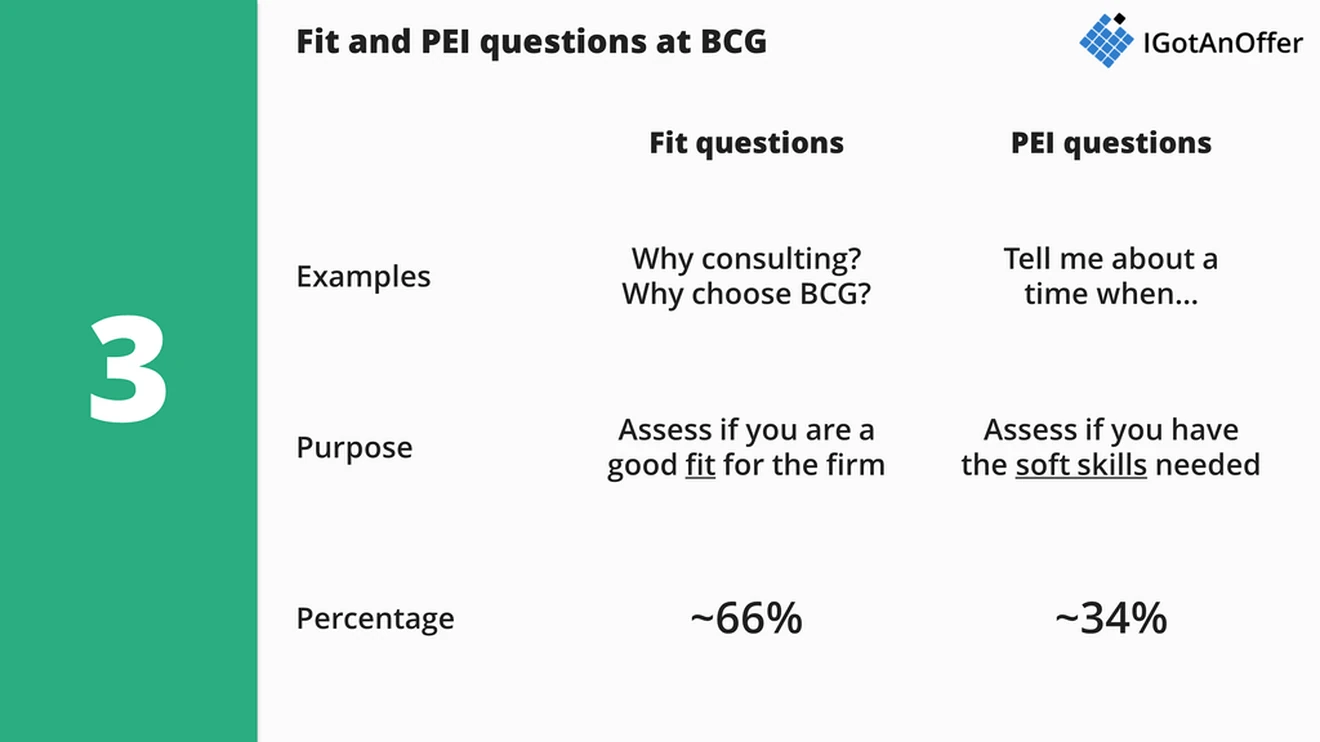
3.1 Top 5 fit questions asked by BCG
Let's step through the top 5 fit questions you will come across in the behavioural part of your interview with BCG. Note that the percentages for the top fit questions discussed here add up to 100%. But as mentioned above, altogether fit questions just make 2/3rds (~66%) of behavioural questions asked by BCG interviewers.
So here is the top 5:
- Why consulting? (23% of fit questions)
- Why BCG? (21% of fit questions)
- Walk me through your resume (7% of fit questions)
- Tell me something that's not on your resume (7% of fit questions)
- What's your career plan / 5-year plan? (6% of fit questions)
- Other (29% of fit questions)
We've covered in detail what you should answer to the "Why consulting?" and "Why BCG?" questions in the past. Questions 2 to 4 are also often asked at other firms and we have covered them in our guide on consulting interview behavioural questions.
But one question that seems to come relatively frequently at BCG but not at other firms is "What's your career plan?" or "Where do you see yourself in 5 years?" This question is a little bit of a trap. Many students candidly reply that they will probably do consulting for 2 or 3 years and then do something else. This is a BIG mistake.
BCG wants to hire junior consultants who are committed to the job and want to make partner. The firm will invest a lot into developing you when you join. And they'll want you to stay as long as possible.
A better answer to the question is something like: "I've carefully thought about whether I want to do consulting or not and decided this was the best option for me. In 5 years I would like to still be a consultant and to start managing teams. I am also keen to specialise in one or two industries at some point. Today I'm interested in retail and technology, but that might change as I try different industries while working at BCG."
3.2 Top 5 PEI questions asked by BCG
Let's now turn our attention to PEI questions asked at BCG. These competency-based questions are actually very similar to the McKinsey Personal Experience Interview questions. They are focused on testing the specific skills that BCG looks for such as: problem-solving, leadership, focus on impact and passion.
The exact way in which your interviewer will ask the question will vary, but it will usually start with "Tell me about a time when..." and then some variation of the topics below. Here is the top 5 for BCG:
- Managing a team conflict / situation (21% of PEI questions)
- Leading others (17% of PEI questions)
- Overcoming challenges (12% of PEI questions)
- Managing a personal conflict (10% of PEI questions)
- Influencing others (9% of PEI questions)
- Other (31% of PEI questions)
The top 5 questions here are also common at McKinsey. If you would like to learn more about these types of questions and how to answer them you should read this article on how to impress your interviewer in personal experience interview questions.
In addition, BCG also asks other PEI question that don't seem to be used by McKinsey nor Bain, according to the analysis we did using Glassdoor.com data. In particular, this includes the following two questions:
- Tell me about your biggest individual / team failure (9% of PEI questions)
- Tell me about a time when you had to deal with ambiguity (7% of PEI questions)
You should prioritise the top 5 questions above in your preparation. But if you have time, or if you make it to the second round of interviews, it will also be worth preparing answers to these two additional questions.
Part 4: BCG case interview preparation plan
So what's the best way to prepare for your BCG case interviews? Let's go through some additional tips to make sure you're fully prepared.
4.1 Become really confident at maths
You don't have to have a perfect GPA or GMAT score to succeed at case interview maths. However, during your BCG interviews, you will be expected to quickly perform accurate mental maths.
ººººIn order to do this, it’s essential to know the formulas for common metrics, like return on investment or breakeven point. And it’s also helpful to know a few maths shortcuts to help you solve problems more quickly. To learn more about these topics, check out our free guide to case interview maths.
In our experience, the most successful applicants start their interview preparation by practising maths skills, so make sure you prioritise this step.
4.2 Develop a consistent method to crack cases
One of the biggest challenges of interviewing with BCG is solving cases that you’ve never seen before. Each case can be difficult, and you’ll have to perform well across multiple case interviews in order to get an offer.
As a result, it’s critical for you to have a consistent approach for solving cases. BCG uses candidate-led case interviews, which can be broken down into the following types of questions:
- Situation
- Framework development
- Framework exploration
- Quant question – Data provided
- Quant question – No data provided
- Creativity question
- Recommendation
If you can crack each type of question (within a case), then you can crack the overall case.
4.3 Practise with peers
Once you're in command of the subject matter, you'll want to start practising cases. But by yourself, you can’t simulate thinking on your feet or the pressure of performing in front of a stranger. Plus, there are no unexpected follow-up questions and no feedback.
If you have friends or peers who can do mock interviews with you, that's an option worth trying. It’s free, but be warned, you may come up against the following problems:
- It’s hard to know if the feedback you get is accurate
- They’re unlikely to have insider knowledge of interviews at your target company
- On peer platforms, people often waste your time by not showing up
For those reasons, many candidates skip peer mock interviews and go straight to mock interviews with an expert.
4.4 Practise with experienced case interviewers
In our experience, practising real interviews with experts who can give you company-specific feedback makes a huge difference.
Find a BCG consulting interview coach so you can:
- Test yourself under real interview conditions
- Get accurate feedback from a real expert
- Build your confidence
- Get company-specific insights
- Learn how to tell the right stories, better.
- Save time by focusing your preparation
Landing a job at a top consulting company often results in a $50,000 per year or more increase in total compensation. In our experience, three or four coaching sessions worth ~$500 make a significant difference in your ability to land the job. That’s an ROI of 100x!






